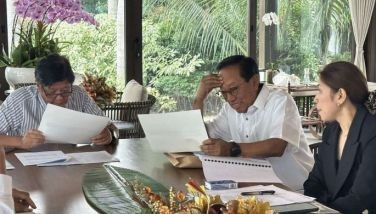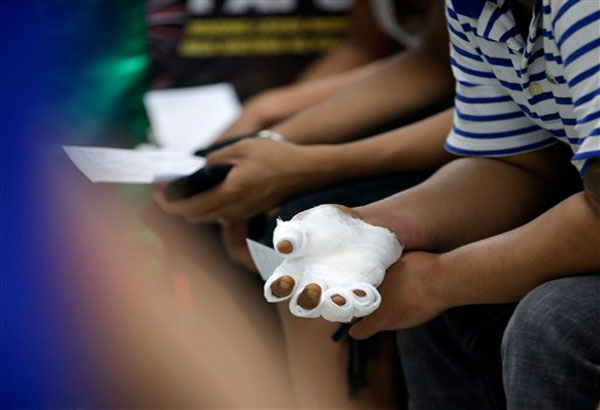‘Phl won’t stand alone’
MANILA, Philippines - The Philippines will not stand alone when confronting external attacks, as the United States is firm in its commitment to help its ally under a 63-year-old mutual defense agreement, US President Barack Obama said yesterday.
“This treaty means our two nations pledge – and I’m quoting – our common determination to defend themselves against external armed attacks, so that no potential aggressor could be under the illusion that either of them stands alone,†Obama said in a speech delivered before some 500 Filipino and US servicemen at Fort Bonifacio in Taguig City shortly before his return flight to the US.
He was referring to the 1951 Mutual Defense Treaty (MDT) with the Philippines.
“Our commitment to defend the Philippines is ironclad and the United States will keep that commitment, because allies never stand alone,†he added, drawing applause from the audience.
Obama’s remarks came a day after critics and observers noted his seemingly guarded and carefully crafted statements on China’s growing aggressiveness in staking its claim to almost the entire South China Sea. Obama’s state visit was the last leg of his four-country Asian tour.
When asked last Monday whether the US would defend the Philippines in the event of armed hostilities with China, Obama did not give a direct answer, stating instead that Washington did not intend to “counter†or “contain†Beijing.
He also reiterated Washington’s position against taking sides in territorial disputes.
In his speech yesterday, Obama noted the importance of upholding territorial integrity and freedom of navigation.
“Deepening our alliance is part of our broader vision for the Asia Pacific. We believe that nations and peoples have the right to live in security and peace, and to have their sovereignty and territorial integrity respected,†he said.
“We believe that international law must be upheld, that freedom of navigation must be preserved and commerce must not be impeded,†he said.
“We believe that disputes must be resolved peacefully and not by intimidation or force. That’s what our nations stand for. That’s the future we’re working for.â€
China’s military buildup is causing jitters among its neighbors, from whom it is trying to wrest control of some islets, shoals, sandbars and coral reefs in the West Philippine Sea and South China Sea.
The Philippines, Vietnam, Malaysia, Brunei and Taiwan have overlapping claims over some uninhabited but potentially mineral- and oil-rich areas in the region.
Taking advantage of the Philippines’ weak military, Chinese forces have occupied areas that are well within Manila’s 200-nautical mile exclusive economic zone, including the Panganiban (Mischief) Reef off Palawan and Panatag (Scarborough) Shoal off Zambales.
China has also set up a blockade around Ayungin (Second Thomas) Shoal to prevent supplies from reaching a grounded ship that serves as a Philippine military outpost.
Manila has brought its territorial row with China before an international arbitral tribunal, but Beijing rejected such an initiative, saying it is only willing to negotiate bilaterally.
Areas of cooperation
Former President Fidel Ramos, who was present when Obama delivered his remarks, said the Philippines should seek collaboration with China on issues like disaster mitigation and poverty.
He said nations should work together to address common problems instead of bickering with one another or worse.
“Who is the enemy here? Is it us against them or them against us? No, the enemy here is climate change, super typhoons, infectious diseases, poverty, hunger, lack of electricity, lack of jobs. That should be our focus,†Ramos said.
“Let us gather all our assets we use for building up lethal weapons and defenses and use them to fight poverty, disease hunger, and ignorance... take care of the young people,†he added.
Sen. Antonio Trillanes IV, a former soldier, said Obama’s remarks should not be construed as referring to the West Philippine Sea row.
“We have to take that away in the context of the territorial dispute because they (US) are also very clear in that regard, that they are not going to intervene in territorial disputes, so we have to deal with the dispute ourselves,†Trillanes said.
“They are not at war with China. They are dealing with China and strengthening their alliance with us, so we can do the same. We can have a strong ally with the United States and deal with China in a more friendly way,†he added.
Leaders of the House of Representatives also expressed satisfaction with Obama’s statement of support for the Philippines, even as they downplayed criticisms that he was less categorical when it came to the dispute between the country and China over the West Philippine Sea.
Leyte Rep. Ferdinand Martin Romualdez, head of the so-called House independent bloc, said Obama’s clear commitment to Japan regarding the latter’s dispute with China on the Senkaku Islands, and his general assurance of security to the Philippines, should not be compared.
Romualdez said even China is not disputing Japan’s administrative control over the Senkaku Islands. He said the legal status of the disputed areas in the West Philippine Sea is seen by Washington as a different case altogether.
“I am satisfied because that is the realistic position the US can take under the circumstances. The important thing is they are here to help ensure a peaceful resolution of the conflict that will be beneficial to all,†Romualdez said.
“He (Obama) said the US commitment to defend the Philippines is ironclad, what could be clearer than that?†Muntinlupa Rep. Rodolfo Biazon, chairman of the House committee on national defense and security, said.
Balanced and prudent
Negros Occidental Rep. Alfredo Benitez said Obama’s pronouncement on the territorial dispute was “a balanced and prudent statement aimed at not provoking China.â€
“I do agree that the military support being given to us by the US is to improve our military capabilities and not to pick a fight with China,†Benitez said.
“We have maintained our stand that the present conflict must be done through international arbitration, as provided by international law,†Parañaque City Rep. Gustavo Tambunting said.
Cavite Rep. Elpidio Barzaga said Obama’s statement was “a very encouraging assurance.â€
Quezon City Rep. Winston Castelo said Obama’s response to questions on China was “fair enough, as history of diplomacy shows that highly charged polemical remarks do not accomplish much except to escalate tension.â€
However, Valenzuela Rep. Sherwin Gatchalian described the visit as “more of a ceremonial stopover rather than a fully committed and substantive visit to a long-time ally.â€
“I firmly believe that President Obama could have given a better account of himself by directly addressing the territorial dispute and refraining from issuing motherhood statements about sovereignty and upholding international laws that govern the conflict,†Gatchalian said.
“It is worth noting that in his previous stops, particularly in Japan and South Korea, President Obama has directly committed to use their assets and influence in the event of an armed conflict with their enemies,†he said.
He said he felt that once again, the Philippines has received the proverbial shorter end of the stick, even with the signing of the Enhanced Defense Cooperation Agreement. - With Paolo Romero
- Latest
- Trending































